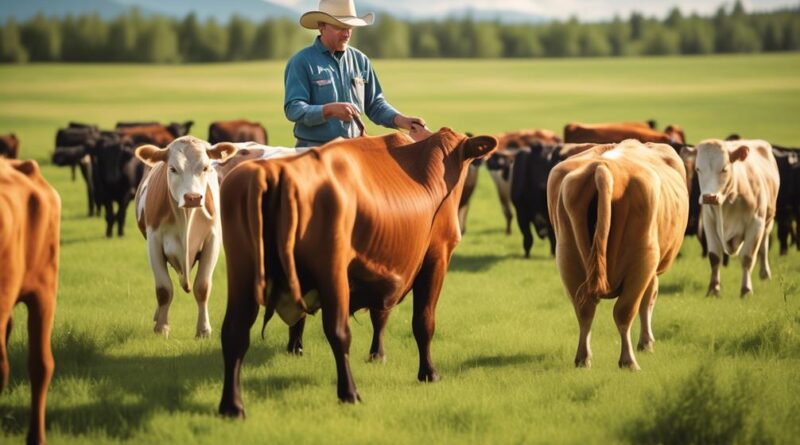14 Holistic Tips for Cattle Parasite Control
You may not be aware that cattle parasites can have a significant impact on the health and productivity of your herd.
But fear not, because there are 14 holistic tips that can help you effectively control and manage these pesky parasites.
From natural deworming methods to stress reduction techniques, implementing these strategies can lead to a healthier and happier herd.
So, if you want to ensure the well-being of your cattle and maximize their potential, stick around to uncover these holistic approaches that may just revolutionize your parasite control methods.
Pasture Management
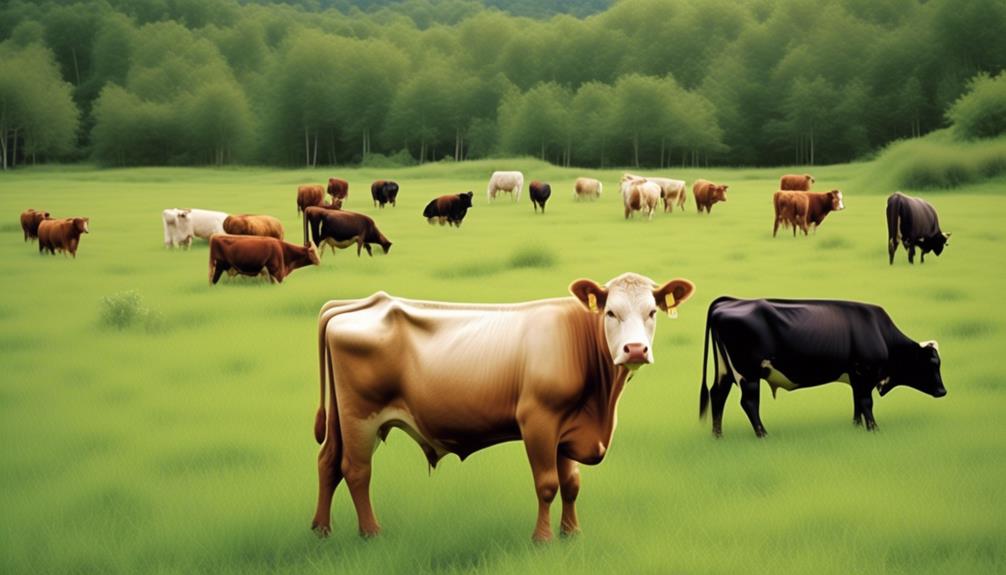
To effectively manage your pastures for controlling cattle parasites, prioritize rotational grazing and regular monitoring of forage quality and quantity.
Rotational grazing involves dividing your pasture into smaller sections and rotating your cattle through these areas. This practice helps to break the parasite life cycle by interrupting their access to fresh forage and reducing the accumulation of parasite larvae on the pasture. Additionally, rotational grazing allows forage to recover and regrow in previously grazed areas, promoting healthier grazing conditions for your cattle.
Incorporating soil fertility management into your pasture routine is also crucial for controlling cattle parasites. Healthy soil promotes the growth of nutritious forage, which is essential for maintaining the overall health and immunity of your cattle. Regular soil testing can help you understand the nutrient levels in your pasture and guide you in making informed decisions about fertilization and soil amendment.
Maintaining proper soil fertility not only ensures the availability of high-quality forage for your cattle but also supports a diverse and resilient pasture ecosystem, which can naturally suppress the proliferation of parasites.
Herbal Remedies
Incorporating herbal remedies into your pasture management routine can provide an alternative approach to controlling cattle parasites, offering natural solutions to complement your existing strategies. Herbal supplements have been found to be effective in supporting cattle health and immunity, contributing to holistic veterinary care. When used in conjunction with other parasite control methods, herbal remedies can help reduce the reliance on chemical treatments and promote a more sustainable approach to cattle management.
Holistic veterinary care emphasizes the overall health and well-being of the animal, and herbal remedies play a significant role in achieving this goal. Certain herbs such as garlic, wormwood, and neem have been traditionally used to deter and expel parasites in cattle. These natural remedies can help fortify the immune system, making the animals less susceptible to infestations. Additionally, some herbs possess natural anti-parasitic properties that can aid in controlling internal and external parasites.
It's important to note that while herbal remedies can be beneficial, they shouldn't replace conventional parasite control methods. Instead, they should be integrated into a comprehensive parasite management plan that includes pasture rotation, proper nutrition, and regular monitoring. Consulting with a veterinarian experienced in holistic approaches can provide valuable insight into the appropriate use of herbal supplements for parasite control in cattle.
Balanced Nutrition
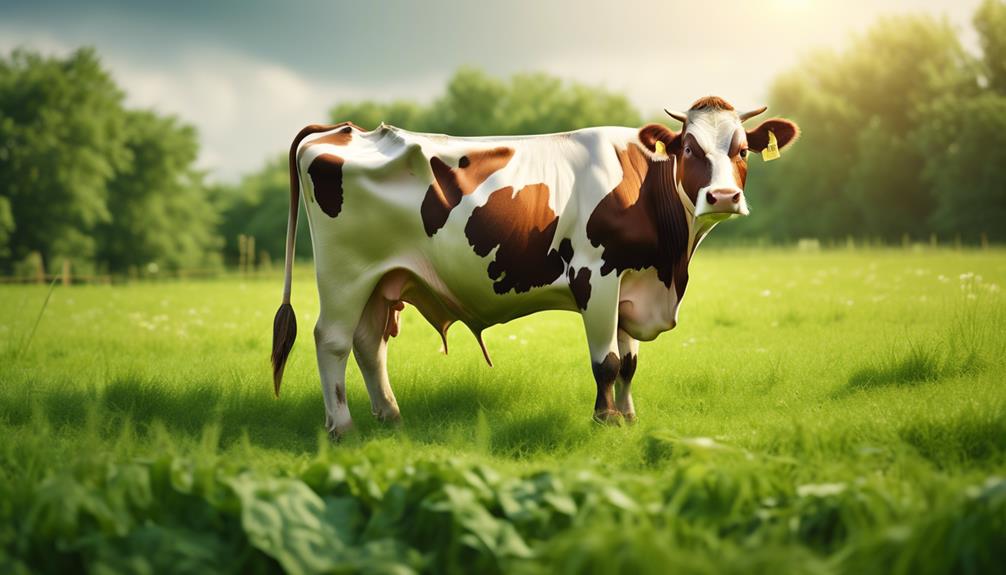
You can ensure balanced nutrition for your cattle by carefully selecting and providing a diverse range of high-quality feed options. Nutrient supplementation plays a crucial role in maintaining the health and productivity of your cattle.
To achieve balanced nutrition, consider conducting a forage analysis to understand the nutritional content of the available pasture and forage. This analysis can help you identify any deficiencies and tailor your cattle's diet accordingly.
In addition to pasture and forage, offering supplemental feed can help meet the specific nutritional needs of your cattle. High-quality hay, silage, and grain can provide essential nutrients such as protein, energy, vitamins, and minerals. When selecting supplemental feed, ensure that it's free from mold, dust, and contaminants that could potentially harm your cattle's health.
Moreover, consulting with a nutritionist or veterinarian can provide valuable insights into formulating a balanced diet for your cattle. They can offer recommendations on the appropriate type and amount of feed, as well as guidance on nutrient supplementation based on your cattle's age, breed, and reproductive status.
Regularly monitoring your cattle's body condition and health can also guide adjustments to their diet. By observing any signs of malnutrition or deficiencies, you can make timely modifications to ensure your cattle receive the necessary nutrients for optimal health and resilience against parasites.
Immune System Support
After ensuring balanced nutrition for your cattle, focus on bolstering their immune system to protect them against parasites and diseases. Strengthening your cattle's immune system can significantly reduce their susceptibility to various health issues. Here are some holistic approaches to support the immune system of your cattle:
- Probiotic Supplementation: Introducing probiotics into your cattle's diet can help maintain a healthy balance of gut bacteria, which plays a crucial role in their overall immune function. Look for probiotic supplements specifically formulated for cattle to ensure optimal benefits.
- Herbal Supplements: Certain herbs such as echinacea, garlic, and oregano have been traditionally used to support immune function in livestock. Herbal supplements can be incorporated into your cattle's diet to provide natural immune-boosting properties.
- Immune Boosting Vaccinations and Stress Reduction Techniques: Consult with a veterinarian to ensure your cattle's vaccination schedule is up to date and includes immune-boosting options. Additionally, implementing stress reduction techniques, such as providing a low-stress environment and minimizing transportation-related stress, can help prevent the suppression of the immune system.
Natural Deworming Methods
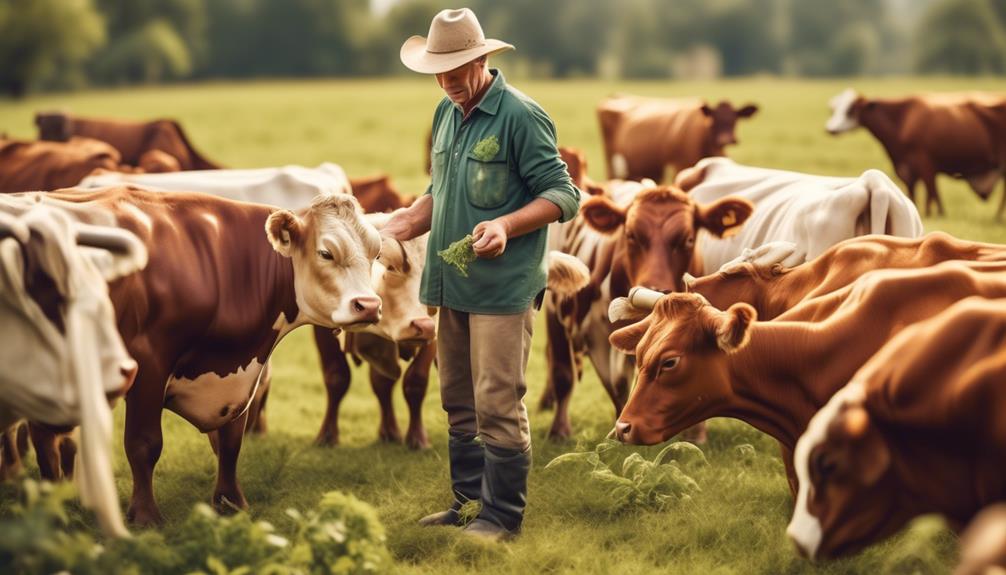
Consider utilizing natural deworming methods to protect your cattle from parasitic infestations and promote their overall health.
Herbal supplements can be an effective natural deworming option for your cattle. Certain herbs like garlic, wormwood, and thyme have been known to have natural deworming properties. You can easily incorporate these herbs into your cattle's diet to help naturally control internal parasites.
Additionally, organic solutions such as diatomaceous earth, when fed to your cattle, can act as a natural dewormer by disrupting the protective layer of parasites, ultimately leading to their dehydration and death.
When using herbal supplements for deworming, it's crucial to understand the proper dosage and administration for your cattle. Consulting with a veterinarian or an experienced herbalist can provide you with the necessary guidance to ensure the safety and effectiveness of herbal deworming methods.
It's important to remember that while natural deworming methods can be beneficial, they should be used as part of a comprehensive parasite control program that includes pasture management and rotational grazing.
In addition to herbal supplements and organic solutions, you may consider other natural deworming methods such as introducing beneficial nematodes to your cattle's environment, as they can prey on harmful parasites.
Stress Reduction Techniques
To further enhance the health and well-being of your cattle, implementing stress reduction techniques can complement the natural deworming methods and contribute to a more comprehensive approach to livestock management. Stress can weaken the immune system of cattle, making them more susceptible to parasite infestations. By reducing stress, you can help your cattle develop a stronger resistance to parasites.
Here are some effective stress reduction techniques for your cattle:
- Meditation Techniques: Believe it or not, cattle can benefit from a calm and peaceful environment. Consider creating a soothing environment for your cattle by playing soft music or providing them with access to quiet, low-stress areas. Additionally, incorporating regular grooming sessions can have a calming effect on your cattle.
- Exercise Routines: Just like humans, cattle can benefit from regular exercise. Providing ample space for your cattle to move around freely can help reduce stress. Encouraging natural behaviors such as grazing and exploration can also contribute to the overall well-being of your cattle.
- Environmental Enrichment: Introducing environmental enrichments such as toys or structures that allow for physical activity and mental stimulation can help alleviate stress in cattle. Providing them with a stimulating environment can reduce boredom and anxiety, leading to a more relaxed and contented herd.
Environmental Hygiene
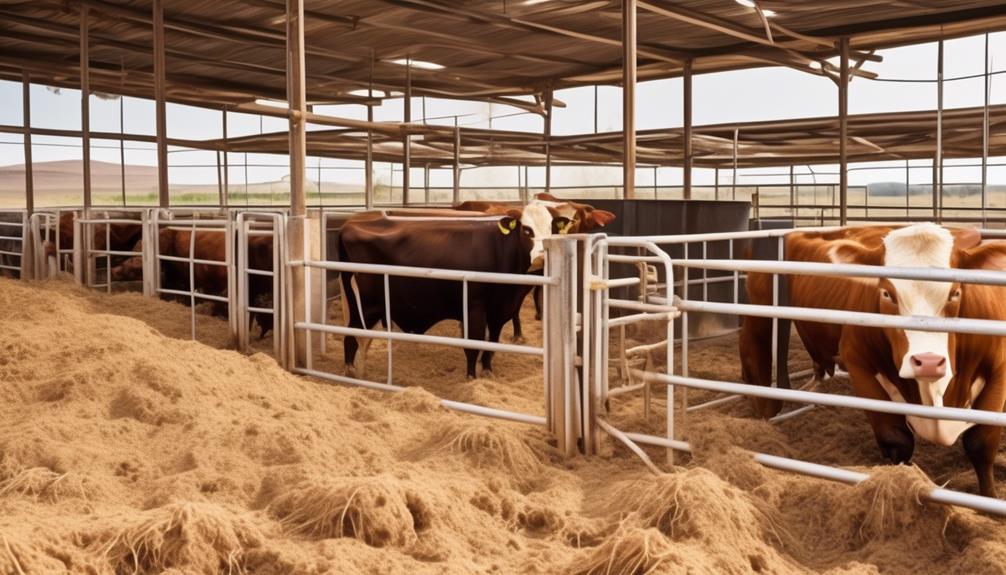
Maintaining a clean and hygienic environment for your cattle is crucial in preventing the spread of parasites and promoting their overall well-being. Proper manure management is essential for controlling parasites. Remove manure from barns, pens, and pastures regularly to minimize the risk of parasite infestation. Manure should be composted or spread thinly on fields to allow it to dry out and break down, which can help kill parasite larvae.
Grazing rotation is another important aspect of environmental hygiene. Rotating the grazing areas for your cattle can help reduce the parasite load in pastures. This practice can prevent overgrazing in specific areas and allow the grass to recover, which in turn disrupts the lifecycle of parasites.
In addition to these practices, consider the layout and design of your cattle's living environment. Ensure that barns and shelters are well-ventilated and designed to minimize moisture accumulation, as damp environments can harbor parasites. Clean and disinfect water troughs regularly to prevent the buildup of parasites in drinking water.
Holistic Herd Health Monitoring
Monitoring the overall health of your cattle herd from a holistic perspective is essential for identifying potential issues and maintaining their well-being. By taking a holistic approach to herd health monitoring, you can ensure that your cattle aren't only free from parasites but also thriving in their environment.
Here are some key aspects to consider when monitoring the health of your herd:
- Herd Behavior: Observing the behavior of your cattle can provide valuable insights into their overall health. Changes in eating habits, social interactions, and movement patterns can indicate potential health issues. For example, if normally social animals become isolated or agitated, it could be a sign of illness or discomfort.
- Regular Veterinary Check-ups: It's important to schedule regular check-ups with a veterinarian who specializes in holistic care for cattle. A holistic veterinarian can provide a comprehensive assessment of your herd's health, considering not only physical symptoms but also environmental factors and overall well-being.
- Nutritional Monitoring: Keeping track of your herd's nutrition is crucial for their holistic health. Ensure that they have access to a balanced diet and monitor their food intake. Changes in appetite or weight can be indicators of underlying health issues.
Frequently Asked Questions
Can Cattle Parasites Be Transferred to Humans Through Contact With Infected Animals?
Yes, cattle parasites can be transferred to humans through contact with infected animals. It's important to implement holistic parasite control measures to protect human health. Utilize natural remedies to limit environmental impact and improve meat quality.
Are There Any Specific Breeds of Cattle That Are More Resistant to Parasites Than Others?
Some cattle breeds show higher resistance to parasites, while others may be more susceptible. Breeds like the Brahman and Criollo exhibit natural resistance, whereas Angus and Holstein are more prone to parasite susceptibility.
How Can I Prevent Parasites From Developing Resistance to Herbal Remedies Over Time?
To prevent parasites from developing resistance to herbal remedies over time, rotate different types of herbal treatments and use them in combination. This approach helps to minimize the chances of parasites adapting to a specific remedy.
Are There Any Potential Negative Effects of Using Natural Deworming Methods on the Environment?
Using natural deworming methods for cattle parasites can have negative effects on the environment. While these methods are effective for deworming, they may impact soil and water quality, and disrupt the ecological balance.
Are There Any Holistic Approaches to Parasite Control That Can Also Improve the Quality of the Meat and Dairy Products Produced by the Cattle?
To control parasites in cattle holistically, consider natural remedies and pasture management. These methods not only improve the health of your cattle but also enhance the quality of the meat and dairy products they produce.
Conclusion
In conclusion, by implementing holistic parasite control methods such as pasture management, herbal remedies, and balanced nutrition, you can support your cattle's overall health and well-being.
Natural deworming methods, stress reduction techniques, and environmental hygiene are also important factors to consider.
By taking a holistic approach to herd health monitoring and immune system support, you can effectively control parasites and ensure the health of your cattle.
